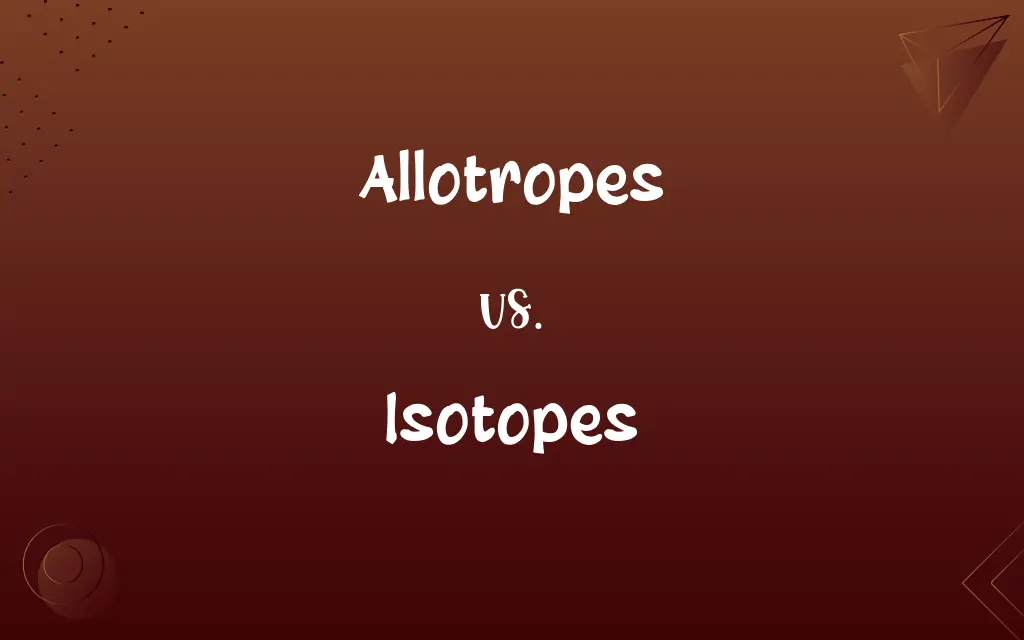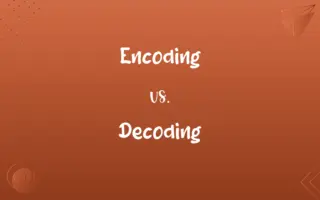Allotropes vs. Isotopes: Know the Difference

By Shumaila Saeed || Updated on December 25, 2023
Allotropes are different forms of the same element with distinct structures; isotopes are variants of an element differing in neutron number but same in proton number.

Key Differences
Allotropes are various structural forms of the same chemical element, such as carbon existing as diamond, graphite, and graphene. Isotopes, on the other hand, are variations of a chemical element that have the same number of protons but different numbers of neutrons, like carbon-12 and carbon-14.
Shumaila Saeed
Dec 21, 2023
The difference in allotropes arises from the different ways atoms bond and arrange themselves, leading to varied physical properties. In isotopes, the variation is in the atomic nucleus, affecting the atomic mass but not the chemical properties.
Shumaila Saeed
Dec 21, 2023
Allotropes can exhibit remarkably different physical and chemical characteristics despite being the same element. Isotopes of an element behave almost identically in chemical reactions, as their electron arrangements are similar.
Shumaila Saeed
Dec 21, 2023
The study of allotropes is important in understanding the versatility of elements like carbon. Isotope study is crucial in fields like radiometric dating, nuclear medicine, and tracing chemical pathways.
Shumaila Saeed
Dec 21, 2023
Allotropy is a phenomenon limited to certain elements, mostly non-metals. Isotopes, in contrast, are universal across all chemical elements, each having at least one isotope.
Shumaila Saeed
Dec 21, 2023
ADVERTISEMENT
Comparison Chart
Definition
Different forms of the same element
Variants of an element with different neutrons
Shumaila Saeed
Dec 21, 2023
Cause
Variation in atomic bonding and structure
Difference in neutron number in the nucleus
Shumaila Saeed
Dec 21, 2023
Physical Properties
Often distinct (e.g., hardness, color)
Mostly similar except for mass
Shumaila Saeed
Dec 21, 2023
ADVERTISEMENT
Allotropes and Isotopes Definitions
Allotropes
Different structural forms of the same element.
Diamond and graphite are allotropes of carbon.
Shumaila Saeed
Dec 14, 2023
Isotopes
Atoms of the same element with varying nuclear compositions.
Uranium-235 and uranium-238 are isotopes used in nuclear reactors.
Shumaila Saeed
Dec 14, 2023
Allotropes
Distinct molecular arrangements of the same chemical element.
Phosphorus has several allotropes, including white and red phosphorus.
Shumaila Saeed
Dec 14, 2023
Isotopes
Elements with the same atomic number but different mass numbers.
Iodine-131, an isotope of iodine, is used in medical imaging.
Shumaila Saeed
Dec 14, 2023
Allotropes
Forms of an element with differing bonding structures.
Sulfur exists in several allotropes, each with unique properties.
Shumaila Saeed
Dec 14, 2023
ADVERTISEMENT
Isotopes
Forms of an element differing in atomic mass.
Carbon-14, an isotope of carbon, is used in radiocarbon dating.
Shumaila Saeed
Dec 14, 2023
Allotropes
Variations of an element with different physical and chemical properties.
Oxygen's allotropes include O2 and ozone, O3.
Shumaila Saeed
Dec 14, 2023
Isotopes
Variants of an element with different neutron numbers.
Hydrogen has three isotopes: protium, deuterium, and tritium.
Shumaila Saeed
Dec 14, 2023
Allotropes
Variants of a single element, differing in atomic arrangement.
Graphene is a newly discovered allotrope of carbon.
Shumaila Saeed
Dec 14, 2023
Isotopes
Different nuclear forms of the same chemical element.
Chlorine has two stable isotopes, Cl-35 and Cl-37.
Shumaila Saeed
Dec 14, 2023
Allotropes
A structurally differentiated form of an element that exhibits allotropy.
Shumaila Saeed
Dec 13, 2023
Isotopes
One of two or more atoms having the same atomic number but different mass numbers.
Shumaila Saeed
Dec 13, 2023
Repeatedly Asked Queries
Can an element have multiple allotropes?
Yes, some elements like carbon have multiple allotropes.
Shumaila Saeed
Dec 21, 2023
What is the importance of isotopes in science?
Isotopes are important in fields like medicine, archaeology, and nuclear physics.
Shumaila Saeed
Dec 21, 2023
Are all elements capable of forming allotropes?
No, not all elements form allotropes; it's more common in non-metals.
Shumaila Saeed
Dec 21, 2023
How are isotopes identified?
Isotopes are identified by their mass number, like carbon-12 or carbon-14.
Shumaila Saeed
Dec 21, 2023
How do allotropes impact the element’s characteristics?
Allotropes can completely change an element's physical and chemical behavior.
Shumaila Saeed
Dec 21, 2023
What defines isotopes?
Isotopes are variants of elements with the same number of protons but different numbers of neutrons.
Shumaila Saeed
Dec 21, 2023
Are isotopes chemically similar?
Yes, isotopes of an element generally have similar chemical properties.
Shumaila Saeed
Dec 21, 2023
Do allotropes have different structures?
Yes, allotropes differ in their atomic or molecular structures.
Shumaila Saeed
Dec 21, 2023
How do allotropes differ in properties?
Allotropes can differ in color, hardness, electrical conductivity, and more.
Shumaila Saeed
Dec 21, 2023
Can isotopes occur naturally?
Yes, most elements have naturally occurring isotopes.
Shumaila Saeed
Dec 21, 2023
What are allotropes?
Allotropes are different physical forms in which an element can exist due to varying atomic arrangements.
Shumaila Saeed
Dec 21, 2023
Are isotopes stable?
Some isotopes are stable, while others are radioactive and decay over time.
Shumaila Saeed
Dec 21, 2023
Can allotropes be transformed into each other?
Yes, allotropes can be transformed under certain conditions, like graphite into diamond.
Shumaila Saeed
Dec 21, 2023
Do isotopes have different uses in medicine?
Yes, isotopes like iodine-131 and technetium-99m are used in diagnostic imaging and therapy.
Shumaila Saeed
Dec 21, 2023
How do isotopes affect atomic weight?
Isotopes contribute to the average atomic weight of an element, as they have different atomic masses.
Shumaila Saeed
Dec 21, 2023
What role do allotropes play in industry?
Allotropes have various industrial applications, like graphite in batteries and diamond in cutting tools.
Shumaila Saeed
Dec 21, 2023
Can allotropes be artificially created?
Yes, some allotropes like fullerene are synthetically produced.
Shumaila Saeed
Dec 21, 2023
Are allotropes relevant in environmental studies?
Yes, allotropes like ozone play significant roles in environmental science.
Shumaila Saeed
Dec 21, 2023
What is an example of a radioactive isotope?
Uranium-238 is an example of a radioactive isotope.
Shumaila Saeed
Dec 21, 2023
What is isotope fractionation?
Isotope fractionation is the process where isotopes separate or fractionate due to different physical or chemical properties.
Shumaila Saeed
Dec 21, 2023
Share this page
Link for your blog / website
HTML
Link to share via messenger
About Author
Written by
Shumaila SaeedShumaila Saeed, an expert content creator with 6 years of experience, specializes in distilling complex topics into easily digestible comparisons, shining a light on the nuances that both inform and educate readers with clarity and accuracy.








































































